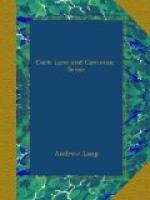Pierre Piquet, guardian of Nicolas Macquereau (a minor), let to Giles Bolacre a house in the suburbs of Tours. Poor Bolacre was promptly disturbed by a noise and routing of invisible spirits, which suffered neither himself nor his family to sleep o’ nights. He then cited Piquet, also Daniel Macquereau, who was concerned in the letting of the house, before the local seat of Themis. The case was heard, and the judge at Tours broke the lease, the hauntings being insupportable nuisances. But this he did without letters royal. The lessors then appealed, and the case came before the Cour de Parlement in Paris. Maitre Chopin was for the lessors, Nau appeared for the tenant. Chopin first took the formal point, the Tours judge was formally wrong in breaking a covenant without letters royal, a thing particularly bad in the case of a minor, Nicolas Macquereau.
So much for the point of form; as to the matter, Maitre Chopin laughed at the bare idea of noisy spirits. This is notable because, in an age when witches were burned frequently, the idea of a haunted house could be treated by the learned counsel as a mere waggery. Yet the belief in haunted houses has survived the legal prosecution of witches. ’The judge in Tours has merely and mischievously encouraged superstition.’ All ghosts, brownies, lutins, are mere bugbears of children; here Maitre Chopin quotes Plato, and Philo Judaeus in the original, also Empedocles, Marcus Aurelius, Tertullian, Quintilian, Dioscorides. Perhaps Bolacre and his family suffer from nightmare. If so, a physician, not a solicitor, is their man. Or again, granting that their house is haunted, they should appeal to the clergy, not to the law.




